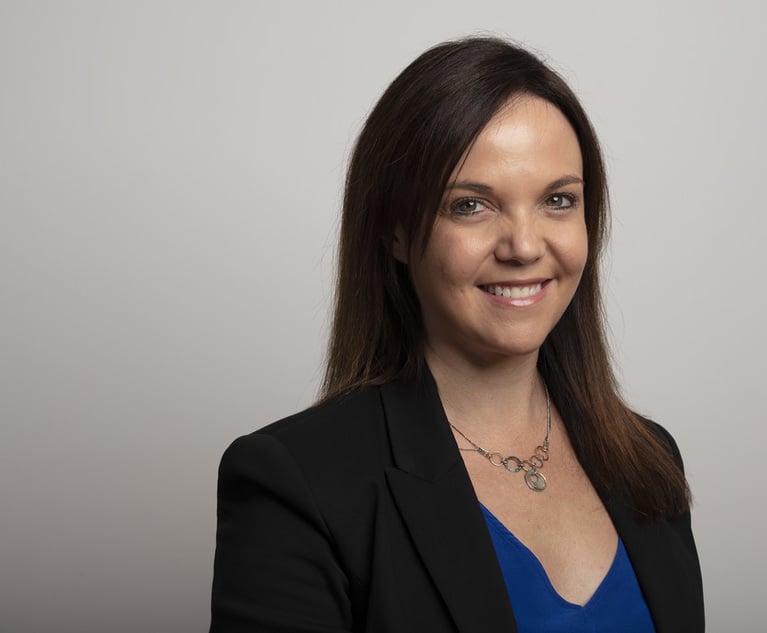Capital Markets Lawyers Busy as Companies Rush to Raise Funds
Australian companies have rushed to raise money on the stock market n the face of the COVID-19 economic crisis, keeping law firms' capital markets teams busy. Herbert Smith Freehills and Linklaters-aligned Allens have each advised on capital raisings totaling more than A$8 billion (US$5.24 billion) since mid-February.
May 10, 2020 at 08:00 PM
6 minute read
Australian companies have rushed to raise money on the stock market to shore up their balance sheets in the face of the COVID-19 economic crisis, keeping corporate law firms' capital markets teams busy even as other parts of law slow down.
In the calendar year to date, some $14.9 billion has been raised in 235 separate equity secondary raisings on the Australian Securities Exchange, according to data supplied by Dealogic to Law.com International.
At the same point in the preceding three years, just $4.6 billion, $6.6 billion and $3.4 billion had been raised.
"It's quite a staggering amount," said Philippa Stone, joint global head of Herbert Smith Freehills' equity capital markets team. "It has been an incredibly active time."
Stone said the raisings have come "thicker and faster" than they did during the global financial crisis, when it took time for businesses to come up against their banking covenants. In the current crisis, many businesses such as those in tourism and hospitality and retail suffered an immediate revenue hit once health restrictions were put in place.
The firm's capital raisings have fallen into two categories.
There are those where companies need to strengthen their balance sheet because of the economic impact of the COVID-19 crisis. For example, HSF has advised health care companies affected by the ban on elective surgery—including hospital group Ramsay Health Care on its A$1.2 billion placement and A$200 million share purchase plan, and hearing aid manufacturer Cochlear on its A$880 million placement and A$220 million share purchase plan.
Other companies are doing well despite the crisis. HSF advised data center NEXTDC on its A$672 million institutional placement and A$191 million nonunderwritten share purchase plan.
At the start of the year, HSF's capital markets team expected to be busy preparing initial public offerings, but now those lawyers who would have been working on IPOs are working on capital raisings, with the expectation that most but not all IPOs will be delayed until next year.
In total, Herbert Smith Freehills has advised on raisings of A$8.2 billion (US$5.4 billion) since mid-February.
Linklaters-aligned Allens has advised on A$8.6 billion (US$5.6 billion) in capital raisings, including the A$3.5 billion (US$2.3 billion) raising by National Australia Bank to bolster its balance sheet. Local corporate firm Clayton Utz said it has worked on about 30 separate capital raisings since the start of the calendar year, among them companies seeking emergency equity raising, including grocery distribution company Metcash and funeral home business InvoCare.
Stone's colleague Michael Ziegelaar, co-head of the Australian equity capital markets group at HSF, expects the rush to quiet down—but only for a while. Most of those firms with an immediate need for cash have already tapped the market, but the market might pick up again towards the end of the year as companies start looking at their banking arrangements and covenants.
Raisings have got a "bit quieter" in the last week, said Adam D'Andreti, a partner in local firm Gilbert + Tobin's corporate advisory team, who said there was a point in time where every weekend he was getting hired for another two raisings that were going to happen the following week.
Since the start of March, the firm has worked on deals to raise capital for such companies as QBE Insurance and Charter Hall Social Infrastructure REIT, a real estate fund.
Gilbert + Tobin also worked on the deal to raise A$1.1 billion for Newcrest Mining, so it could acquire a gold mine in Ecuador—a sign that not all capital raisings are from COVID-19 affected companies seeking to shore up their balance sheets.
While the initial burst of raisings has taken place, D'Andreti expects more real estate companies to tap the market in the coming weeks, before a second wave later in the year. These are more likely to be complex transactions involving restructures and a strategic investor taking a significant equity stake, he said.
Gilbert + Tobin has done a comparison of capital raisings in the first two months of the global financial crisis and those in the first two months of the COVID-19 pandemic. The number of raisings in the current crisis is about double the number done during the 2008-2009 financial crisis, the firm found.
D'Andreti also cited Bloomberg figures showing Australian companies raised $8.9 billion in April—the biggest monthly total since the great financial crisis of 2009 and close to the $11.1 billion raised in the U.S.—a market 28 times the size of Australia's.
One reason for the relatively high figure is Australia's huge pool of retirement savings—close to A$3 trillion (US$2 trillion) in February.
Another is the regulatory environment.
"From a regulatory standpoint, it's much easier for companies in Australia to raise quickly in response to this sort of event because we have relief that means you don't have to use a prospectus," D'Andreti said. "You can actually just physically do it quicker."
In particular, companies can use what's known as the "low doc" regime which allows companies to disclose any material information they haven't previously informed the market of, instead of issuing a prospectus.
The surge in capital raisings comes as regulators in Australia loosen rules to help companies restore their balance sheets more quickly.
The Australian Securities Exchange is temporarily allowing companies to do placements equal to 25% of their issued stock, up from 15%. In a placement, a company raises money by issuing new shares to a group of shareholders or investors.
The regulator also requires companies to subsequently make the same offer to retail shareholders via a share placement plan or similar arrangement.
While the change has been useful, D'Andreti said its influence shouldn't be overstated. Only about a third of placements have temporary extra placement capacity, with companies doing larger raisings of over A$100 million more likely to rely on it, figures complied by Gilbert + Tobin show.
Separately, the corporate regulator has also allowed companies that have had their shares suspended for up to 10 days in the previous year to use the low doc capital raising regime. Previously the limit was five days.
"This provides entities with more flexibility to remain in voluntary suspension for longer periods while they structure their offer, engage with investors and other third parties such as debt financiers, and finalize details of their capital raising plans," Baker McKenzie said in a note to clients.
NOT FOR REPRINT
© 2025 ALM Global, LLC, All Rights Reserved. Request academic re-use from www.copyright.com. All other uses, submit a request to [email protected]. For more information visit Asset & Logo Licensing.
You Might Like
View All
Goodwin's Singapore Private Equity Partner Leaves to Join Key Client Hillhouse Investment


Law Firms Mentioned
Trending Stories
- 1Departing Attorneys Sue Their Former Law Firm
- 2Pa. High Court: Concrete Proof Not Needed to Weigh Grounds for Preliminary Injunction Order
- 3'Something Else Is Coming': DOGE Established, but With Limited Scope
- 4Polsinelli Picks Up Corporate Health Care Partner From Greenberg Traurig in LA
- 5Kirkland Lands in Phila., but Rate Pressure May Limit the High-Flying Firm's Growth Prospects
Who Got The Work
J. Brugh Lower of Gibbons has entered an appearance for industrial equipment supplier Devco Corporation in a pending trademark infringement lawsuit. The suit, accusing the defendant of selling knock-off Graco products, was filed Dec. 18 in New Jersey District Court by Rivkin Radler on behalf of Graco Inc. and Graco Minnesota. The case, assigned to U.S. District Judge Zahid N. Quraishi, is 3:24-cv-11294, Graco Inc. et al v. Devco Corporation.
Who Got The Work
Rebecca Maller-Stein and Kent A. Yalowitz of Arnold & Porter Kaye Scholer have entered their appearances for Hanaco Venture Capital and its executives, Lior Prosor and David Frankel, in a pending securities lawsuit. The action, filed on Dec. 24 in New York Southern District Court by Zell, Aron & Co. on behalf of Goldeneye Advisors, accuses the defendants of negligently and fraudulently managing the plaintiff's $1 million investment. The case, assigned to U.S. District Judge Vernon S. Broderick, is 1:24-cv-09918, Goldeneye Advisors, LLC v. Hanaco Venture Capital, Ltd. et al.
Who Got The Work
Attorneys from A&O Shearman has stepped in as defense counsel for Toronto-Dominion Bank and other defendants in a pending securities class action. The suit, filed Dec. 11 in New York Southern District Court by Bleichmar Fonti & Auld, accuses the defendants of concealing the bank's 'pervasive' deficiencies in regards to its compliance with the Bank Secrecy Act and the quality of its anti-money laundering controls. The case, assigned to U.S. District Judge Arun Subramanian, is 1:24-cv-09445, Gonzalez v. The Toronto-Dominion Bank et al.
Who Got The Work
Crown Castle International, a Pennsylvania company providing shared communications infrastructure, has turned to Luke D. Wolf of Gordon Rees Scully Mansukhani to fend off a pending breach-of-contract lawsuit. The court action, filed Nov. 25 in Michigan Eastern District Court by Hooper Hathaway PC on behalf of The Town Residences LLC, accuses Crown Castle of failing to transfer approximately $30,000 in utility payments from T-Mobile in breach of a roof-top lease and assignment agreement. The case, assigned to U.S. District Judge Susan K. Declercq, is 2:24-cv-13131, The Town Residences LLC v. T-Mobile US, Inc. et al.
Who Got The Work
Wilfred P. Coronato and Daniel M. Schwartz of McCarter & English have stepped in as defense counsel to Electrolux Home Products Inc. in a pending product liability lawsuit. The court action, filed Nov. 26 in New York Eastern District Court by Poulos Lopiccolo PC and Nagel Rice LLP on behalf of David Stern, alleges that the defendant's refrigerators’ drawers and shelving repeatedly break and fall apart within months after purchase. The case, assigned to U.S. District Judge Joan M. Azrack, is 2:24-cv-08204, Stern v. Electrolux Home Products, Inc.
Featured Firms
Law Offices of Gary Martin Hays & Associates, P.C.
(470) 294-1674
Law Offices of Mark E. Salomone
(857) 444-6468
Smith & Hassler
(713) 739-1250










